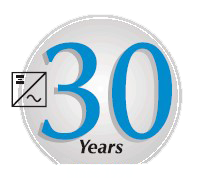Solar panels are a great way to sustainably power commercial buildings. However, before a company enjoys the cost savings and environmental benefits of solar power, it must convert the Direct Current (DC) electricity that the panels produce to Alternating Current (AC) electricity that many types of machinery and appliances use. To facilitate the conversion, a power inverter that changes DC to AC is implemented on the power line between solar panels and buildings.
Choosing the Right Model
Although all power inverters convert DC to AC, they differ concerning several important criteria. A converter that is suitable for one application may not be appropriate for another. In many cases, companies have implemented the wrong product, had it fail during service, and then implemented the right product with the help of Exeltech. To ensure that you get the right inverter for your company’s solar application, select the device based on the criteria below.
Size
The “size” of an inverter refers to its ability to provide peak power (a.k.a. surge power) and usual power. Peak power is the maximum amount of electricity the device can supply for a short period of time, while usual power is the amount of electricity it will supply under normal conditions. The size ratings of inverters range from 50 watts to 50,000 watts. Inverters with a size rating of 12,000 watts or above are generally used for commercial applications.
Modified or Sinusoidal
Power inverters are typically purchased in one of two models: modified or sinusoidal. Modified models transmit a current that is represented by an angular wave form, whereas sinusoidal models (a.k.a. pure sine wave inverters) transmit an undulating wave form. Because sensitive electronics are designed to receive sinusoidal current, supplying them with non-sinusoidal current can result in harmonic distortion, or simply cause the equipment to stop working.
NEBS or Standard
NEBS inverters — particularly ones that have a level 3 rating — are designed to withstand adverse operating conditions such as humidity, vibration, unusual altitudes, unusual acoustics, and airborne contaminants, to name a few. If you need inverters that will perform under special operating conditions, you may need a NEBS inverter instead of a standard one. Exeltech sells level 3 NEBS inverters that can perform under adverse conditions year after year.
Need help selecting an inverter?
If so, Exeltech is the company to call. We have years of experience helping companies select the right equipment for their electricity conduction needs. If your company plans to create a solar installation, we’ll help you select the right power inverters in terms of size, waveform, and NEBs certification. Call us today at (800) 886-4683 to learn more about our products and services, or click here to use our contact form.




